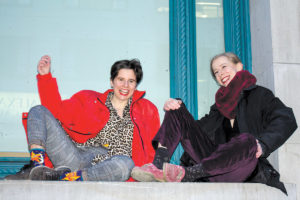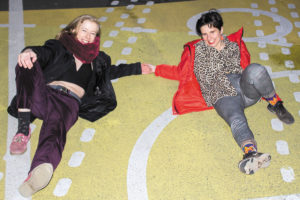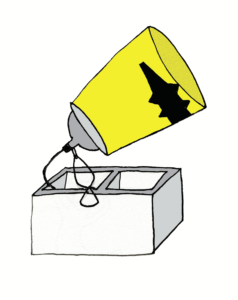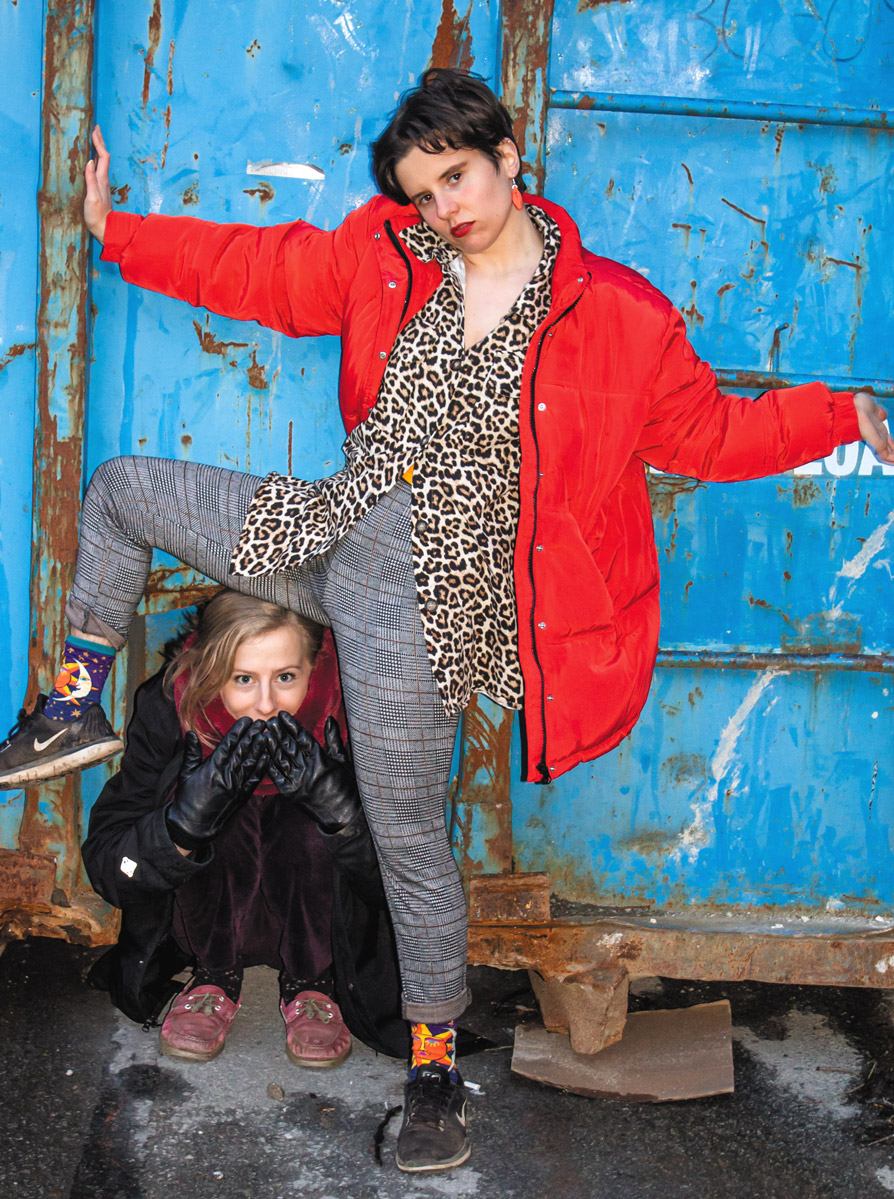TP’s performances use poetry to create alternate realities, while also offering possible futures.
As poets, TTP understands the power of words. They can see the potential for resistance in language, and they understand that language can be used to dismantle systems of oppression.
The poetry trio Tiny Tricycle Poets is aptly named; each poet carries an individual voice, but together the trio is moving in one direction, each one propelled by the other. The three wheels of the tricycle are Angelic Proof (he/they), Emma Field (she/they) and Andrew Warner (she/he/they). Angelic is a poet and a clown, Emma is a microbiologist, and Andy, whose “poetry and artwork is meant for the uncomfortable,” loves to let audiences know “you’re weirder than you think.” Although the media has tried (and failed) to put a finger on exactly what Tiny Tricycle Poets is – using phrases like “fringe artists,” “scientists,” and “gay and mentally ill,” – the group wonderfully eludes a single definition. They are poets, they are clowns, they are performers, they are a “very exclusive” artist collective — only three spots open. Tiny Tricycle Poets (TTP) describes a friendship as much as it does an art.

Angelic, Emma and Andy each began their poetry careers with Slam Poetry, but have since moved on to challenge the conventions of the genre. “What if we were funny at the sad time?” Emma asks, “And what if we dropped this little easter egg here, and what if we confuse people, and what if we disgust people, and what if we arouse people?” TTP enjoys “having the freedom to make a mishmash, to make a mess, and be playful.”
In the hands of TTP, spoken word poetry is a blend of performance, poetry, and clowning. Performances lift a poem off the page and infuse it with meaning. Andy reflects on a particularly meaningful staging arrangement that occurred when the trio was performing “That’s What She Said” at the Vogue theatre. “There’s a moment where I don’t even speak but [the poem reads] ‘she is in the centre of the room now,’ and we’re kind of using the theatrics of performance poetry to guide people’s eyes towards me. At the time I had more masculine features and things [that would leave the audience] questioning, or starting to have these conversations within themselves. And that’s where I feel like written poetry just can’t compare. Performance poetry saves space for that beautiful magic.”

Although TTP perform together, they write poetry individually. As they recite poems in one voice, TTP are holding each other’s words, and allowing their own experiences to be held and carried by their friends. Their work is anchored in their care and attention to each other. In this community, compassion and solidarity is so much a part of what brings their three voices into one. Andy describes the process as partly “healing together” and “understanding each other and walking in each other’s shoes.” Emma remembers feeling uncertain when they first joined in Angelic’s performance of “Fuck Boy,” but eventually realized that she shared Angelic’s feelings: “I didn’t put my head down and write that, but it gave me access to those feelings, to those energies, to that pain even, and to the healing of that poem, that I didn’t construct but I got to experience with Angelic and Andrew.”
For TTP, poetry is alive and is constantly transforming. Although some of their poems are recorded in videos, the group agrees that those recordings are, in Emma’s words, like a “time capsule” — only a brief moment in the lifespan of the poem. Meaning shifts depending on the performer or the audience. Even poems written for, or about, an individual may change over time, perhaps to be about someone else, or to focus instead on the intense emotion behind the words.

TTP’s performances powerfully blend the vulnerability of self-discovery with the freedom of storytelling.
“I have heard that I share quite a bit in my poetry,” Andy says. “Mental illnesses, for example, are big for me. I talk about having OCD, panic, anxiety, the whole gambit. That’s what the expression is,” they add, “I don’t know where the gambit is, but I’ll find it one day.”
“Part of the reason why I also love to do performance poetry, as opposed to written work, is that some people, so I hear, say that I ‘pass until I speak.’” Andy explains that when she performs her poetry, she “allows the audience into a story that they might not have otherwise heard, because trans people are so hidden in society.”
“To go back to the first rule of poetry that we learned back in like 2012, ‘lie to tell the truth.’” Angelic notes that poets can “play with language in a certain way that might not be literally what happened, but it is very much spiritually, emotionally, the most true that it could be.”
In offering intimacy to groups of loose acquaintances or strangers, TTP’s poetry blends community with individuality.
“As poets, when we tell those stories, as wide as they can be, as far as they can reach, it really just brings our community closer,” Andy reflects.
The stories shared in TTP’s work are often challenging and painful, yet their performances remain playful and filled with joy. The content of their work is not trivialized, but the poems have a tone of hope and resistance that is able to lift the audience.

“It’s giving space to the painful things, the wounds, just as much as you’re giving space for the joy and the playfulness,” Emma explains, illustrating how their poetry exists in relationship to clowning; “The clowning exists between that space of laughing and crying at the same time, and it’s not because the clown has to laugh to make up for the crying, but that there’s room for both of those things at once. And that’s something that should be made clear at the beginning of the performance. Your pain is welcome here. Your joy is welcome here. We can stare into the wounds, but we can also dig ourselves out and explore other realities together.”
Remembering advice they received in their youth, Andy remembers the frustration and harm that comes from forced positivity; “People give that advice of, ‘Oh, it gets better, feel better,’ but a lot of the queer and trans people I met were like, “Mmm mmm. We get better. We get stronger. We get more skilled at what we do so that we are the ones who end up making that change.’”
As poets, TTP understands the power of words. They can see the potential for resistance in language, and they understand that language can be used to dismantle systems of oppression. Referencing the well-known speech act, ‘I now pronounce you husband and wife,’ Angelic reflects on the ability for words to create a reality, “You declare something like ‘I am queer and I am powerful,’ and you actually just changed the fabric of reality. You created something, you created yourself, you created everybody in that room with you.”

“In the revolution, what comes to mind is the activist poet talking about social justice,” Emma observes, “But, I think that one of the really foundational parts of poetry and performance is vulnerability with yourself, honesty with yourself, asserting yourself. […] How do we expect ourselves to be activists in the social grand landscape if we can’t assert who we are on a personal level, and say that in front of a group of people? Like, ‘this is who I am!’ and defend who you are, and create who you are. […] Only once we do that can we begin to dream other futures.”
TTP’s performances use poetry to create alternate realities, while also offering possible futures.“Fuck Boy,” performed by the trio at the Vogue Theatre, brings the audience into an alternative world with the assertion: “Until they orgasm believing in the wage gap!/ Until they moan my name, and also Alexandria Ocasio-Cortez!/ Until they stop running for president!/ Until abortion clinics are as frequent as Starbuckses!/ Until they realize that God has always been a lesbian!”
Emma remembers, “When we were doing that opening, it was literally before the show had started and people were still finding their seats. Literally that person, with their popcorn, finding their seat in that theatre while we’re saying that — that’s part of the poem.What is it to be in a space, and that to be the ambient sound, to be able to hear those things, and that to be normal.”
Reflecting on the performance, Angelic notes that, “You can kind of ‘get away’ with saying something super radical and revolutionary, like ‘abortion clinics as frequent as Starbucks.’ It’s just that. That’s just what it is.’”
“There’s this systemic way that language is grabbed from us, to not name those things, to not name violences.” Angelic continues, noting the intimate relationship between language and reality. They reflect on James Baldwin’s assertion, that the lack of language to name the violence of white supremacy is related to the radical act of naming and of giving language to that experience. Angelic explains, “Kind of how Andrew was talking about ‘how do you manifest the dream,’ and how Emma was saying, ‘how do we create ourselves when we put that language out there?’ My professor at NYU said, ‘you need to write towards, not against’ and that really stuck with me, too, when I think about how poetry is revolutionary. […] I don’t want to write about how sad I am that there are no abortion clinics, I’m just going to tell you right now that there are these abortion clinics here, and this will happen, and God is a lesbian […] Giving that language back to myself, and back to the audience, to name and imagine those things, as opposed to being suffocated, the way oppression wants us to be, to not dream. […] You can talk about words like misogyny or transphobia or homophobia, but the way that it actually lives in your body is so unnamed. There is a revolution in naming the horrors, and there is also a revolution in naming what is beyond the horrors — and giving it to the audience. Which is my favourite thing to do. Like, ‘this is where we are, this is where we’re going, and come with me.’ And before the audience can process it, they’re with me, and God is already a lesbian.”
“I always say, ‘the more normative the audience, the more radical you go,’” Andy adds, reflecting on their desire to disrupt the binary and to allow space for people to question themselves, and each other.
The poets are looking forward to living into the futures they are creating. They will continue the radical acts of imagining realities beyond oppression and building alternative worlds through their poetry. Followers can look forward to a podcast called Hey Baby, Let’s Transcend by Angelic and Andy, a chapbook by Emma and Angelic, Andy’s poetry album, @AndrewWarnerPoetry, and a virtual queer space curated by the trio.
“The energy of being in person, together, as queer people is so important and so necessary for our literal survival,” Angelic explains, “I think that we want to do everything in our power to keep the energy of delight and joy present in these tumultuous times.”
Andy recalls a conversation with Angelic about experiencing writer’s block, in which Angelic advised her, “The poems have always been inside you, they just need to know that it’s safe to come out.” Andy goes on to explain that it is this safety which they aim to create with the launch of aqueer and trans virtual space. They want “to be able to create that feeling more regularly and more reliably for the next generation of queer and trans kids.”
The Tiny Tricycle Poets are writing towards the futures they want to live in: they are creating alternate realities through their words, and are dismantling oppression through imagining worlds beyond its borders. The poetry of Tiny Tricycle Poets is radical, joyful, honest and revolutionary. They are taking our hand, and guiding us into the future. It will be our privilege to join them.
You can find Angelic Proof on Instagram at @angelic.cunt, and Andy on Facebook, Youtube and Instagram at Andrew Warner Poetry, and on Twitter @andrewwarnerpo (“because they’re cutting down all the trees”). Emma isn’t on Instagram, but loves receiving emails at the trio’s address, tinytryciclepoets@gmail.com. You can watch TTP’s performances on Youtube at Tiny Tricycle Poets, and follow them on Facebook and Instagram under the same name. Andy recommends you check out TTP’s Youtube channel to relive queer existence on camera.


